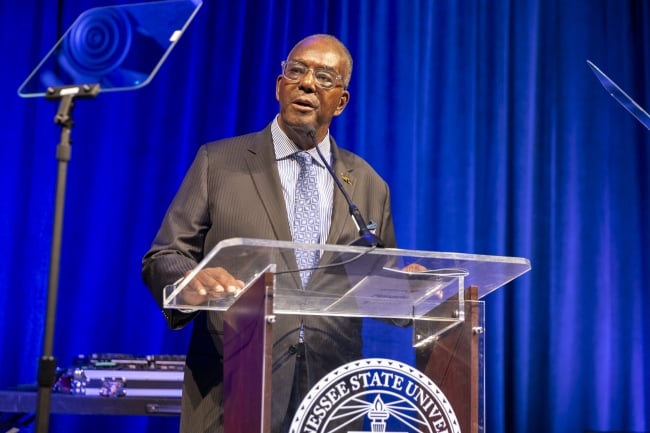You have /5 articles left.
Sign up for a free account or log in.

Interim president Ronald Johnson believes Tennessee State is headed for a better trajectory.
Tennessee State University
Times are lean at Tennessee State University. The historically Black land-grant institution cut 114 positions this semester, slashed duplicative contracts for software and other services, and froze all nonessential hiring and spending in an attempt to get its finances back on track. The chronically underfunded university has gone so far as having staff use golf carts instead of larger vehicles on campus as a cost-saving measure.
State auditors informed the Tennessee State Board of Trustees at a recent meeting that the university could face a $46 million deficit at the end of the year. The university had $8.4 million in reserves when its interim president Ronald Johnson started this summer—about one-fourth of what he’d consider “healthy,” Johnson told Inside Higher Ed.
Earlier in the month, state officials gave the university an early allocation of $11 million and $32 million in liquid funds, previously designated for a new academic building, to enable the university to make November payroll and pay operating costs. (The building will be built using capital improvement funds instead.)
But some lawmakers told university leaders at a tense Nov. 14 state hearing not to expect such help in the future.
“There is no reason for you to feel like the pressure has been relieved,” Jason E. Mumpower, Tennessee comptroller of the treasury, said at the hearing. “It is up to you to reorganize, reorient and lead a rebirth of this university … The state cannot continue on a month-to-month basis propping up the payroll at the university.”
Johnson said Tennessee State has already made significant strides. For example, he noted that the estimated $46 million deficit at the end of the year would have been $52 million had TSU not made meaningful cuts. Administrators have taken a granular look at the university’s expenses and made changes accordingly, he said, from cutting back on travel for its marching band to changing how promoters are paid for its annual homecoming. The university is also trying to improve retention by overhauling its student advising model.
Tennessee State University is “an institution that matters,” Johnson said. “We want to make sure that the institution continues to matter and have greater impact with respect to its mission and to do so in a way that we continue to maintain our finances.”
Nonetheless, the cutbacks and torrent of bad news have left faculty members uneasy.
Learotha Williams, a professor of African American and public history, said he worries that students can feel a shift in faculty and staff’s “overall morale.” And from a practical standpoint, it’s challenging for him that staff members he used to call on for support services for his students aren’t there anymore. He expects more layoffs to come.
“There’s a lot of uncertainty,” Williams said.
Mismanagement, Chronic Underfunding or Both?
How did Tennessee State get into such deep financial trouble? It depends on whom you ask.
Some state lawmakers have put the blame squarely on the university’s former president, administrators and trustees—so much so that they voted to vacate the university’s 10-member board this spring and replaced it with university alumni hand-picked by Republican governor Bill Lee, an outrage to some of the university’s staff, graduates and supporters.
A forensic audit of the university released earlier this year, paid for by the state, found no fraud or malfeasance by administrators but identified “significant procedural deficiencies” and some “not sustainable” spending, including a 250 percent increase in money spent on student scholarships between 2020 and 2023. The audit also details a “student housing crisis” in academic years 2021 and 2022, due to an enrollment boom, in which some students had to live in local hotels in Nashville.
Michael Campbell, a legislative audit manager for the Tennessee Comptroller of the Treasury, said past audits have found a variety of issues at the university including inaccurate financial reporting, delayed bank reconciliations and problems with collecting payments from students and other entities, including the Saudi Arabian Cultural Mission, which pays for Saudi students to attend Tennessee State.
“It starts with management. Management needs to establish proper oversight in all aspects of the university,” Campbell said.

Tennessee State University students at graduation in 2022.
Seth Herald/AFP/Getty Images
Johnson blames the university’s sharp enrollment decline, among other factors, for its financial troubles. Enrollment plummeted from 8,198 students last fall to 6,310 this fall—a devastating blow for an institution heavily dependent on tuition dollars. He believes that drop-off is partly because students were fed up with the housing crunch, but he also blames the botched rollout of the new Free Application for Federal Student Aid, which prevented many high school seniors from completing the form. (He stressed Tennessee State isn’t alone—the University of Memphis predicted a 25 percent loss in freshman enrollment this fall.)
FAFSA is “another part of the perfect storm,” Johnson said.
Other university supporters, including former president Glenda Glover, have thrown the blame right back at state lawmakers. They claim that chronic underfunding, equating to billions of dollars, has hampered the university’s financial growth for decades.
A report by the Tennessee Office of Legislative Budget Analysis in 2021 found the state had shortchanged the university by between $150 million and $544 million in unpaid land-grant funds over at least 50 years. State lawmakers coughed up $250 million last January, but some university advocates argue the money was restricted for infrastructure costs and made up a fraction of what the cash-starved university is owed.
The U.S. Education and Agriculture Departments put the underfunding estimate even higher, at $2.1 billion from 1987 to 2020, in a 2023 letter to Lee. They found, based on an analysis of 16 states, that Tennessee had underfunded its historically Black land-grant institution more than any other state.
“The state of Tennessee should recognize that finger pointing, scapegoating, mischaracterizing the facts, engaging in retaliation, and taking occurrences out of context will not explain away the fact that the State owes TSU $544 million and $2.1 billion dollars,” Glover wrote in a scathing comeback to lawmakers’ critiques, published in The Tennessee Tribune in November. “Any planning or discussions that do not address this fact are pretextual at best.”
Glover repudiated the claims that her administration caused the university’s financial woes. She said that relations with policymakers soured after the state’s debts were uncovered and university leaders pushed for the funds. She also argued that enrollment fell, at least in part, because of state officials’ “negative public attacks on the university,” including its drastic move of replacing the entire board.
“In follow-up conversations with applicants, many students and their parents reported that they chose not to attend TSU because of the negative publicity,” she wrote.
Glover also claimed university leaders dipped into cash reserves last year because the state delayed reimbursing state scholarships to students, as it would have normally done, until the university was finished with its audit process.
Glover’s reputation, and her buyout deal, have been on the line since news of Tennessee State’s financial challenges spread. The university’s Board of Trustees unanimously voted in a November meeting to further cut costs by urging Johnson to end a buyout agreement with Glover, who retired in June. She was set to receive $850,000 through a transition agreement and $212,500 annually for four years in a role where she’d continue to help with fundraising and advising, according to The Tennessean.
Johnson said the state attorney general’s office, which represents the university in legal matters, is currently in discussions with Glover regarding the agreement. “The board gave me responsibility, and that responsibility is now being handled,” he said.
A spokesperson for Glover wrote in an email to Inside Higher Ed that the controversy over her buyout agreement is just another “distraction from the much larger issues involved in the state’s failure to compensate TSU for decades of underfunding.”
Williams agreed that historic underfunding is “at the root” of the university’s current financial issues.
Glover’s administration “may have made some mistakes,” he said, but “one of the things about working at an HBCU is that all of your stumbles are going to be magnified.” HBCUs are often hyperscrutinized for their missteps, Williams said, based on racial stereotypes that “Black folks are bad with money” or “extravagant.” As an example, he noted that other universities, including in Tennessee, have housed students in hotels before without it drawing so much negative attention from state lawmakers.
As Williams sees it, Glover and other administrators have been judged harshly for inheriting the challenges of running an underfunded institution—and for demanding the state pay up.
“We’ve been making bricks without straw from day one,” Williams said, “and we’ve always been criticized for not making as many bricks as UT [the University of Tennessee] or other places.”
But John Dunn, director of communications for the Tennessee Comptroller of the Treasury, said that as far as he’s concerned, historic underfunding isn’t what’s at issue.
“Our work is really based around the financial resources that the university has at the present time,” Dunn said. “We’re interested in how well it’s managing the money it has, and certainly our audits have shown that that financial management has been poor at TSU.”
But “the new board and the new interim management are coming to a realization that there’s a lot of work ahead of them,” he added. “It does appear that they’re taking this pretty seriously.”
And Now, a Lawsuit
Adding to the tumult is friction with a former financial aid director.
Tanaka Vercher, who worked at TSU for 21 years, sued the university last week, claiming officials retaliated against her for following federal rules. Vercher insisted on completing a required reconciliation process to verify student financial aid information was sent to the federal government, including students’ eligibility.
She reportedly told university leaders over the summer that financial aid dollars wouldn’t come through until October because of the required validation process. She also informed them that roughly 20 percent of students had been admitted without proof of a high school diploma and therefore couldn’t receive financial aid, amounting to about $7 million.
A consultant hired by the university allegedly told Vercher that financial aid dollars would come too late if she proceeded as planned. She was fired the next day with no explanation, the lawsuit says, despite a history of positive performance reviews.
“The only explanation is that TSU was retaliating against her for her refusal to request government funds for TSU to which she knew TSU was not entitled,” the lawsuit reads. Vercher is asking for back pay, front pay, lost benefits and pension, damages, and attorney fees from the financially beleaguered institution. (Vercher didn’t respond to email requests for comment from Inside Higher Ed.)
Johnson said he couldn’t comment on pending litigation. “I know that our process in financial aid and our process related to our obligations to employees in the employee handbook are all something that we prosecute,” he said. “We make sure that we are in alignment.”
The interim president said he’s ready to move on from the university’s troubles and initiate a better era for Tennessee State.
“We have to make sure that we are in a position to sustain a future-ready TSU,” he said. “The reason why we’re doing all this is so that these students can go out and make a difference in the lives of people. Because it matters, we have to make sure that we put it in a position to continue to matter.”





